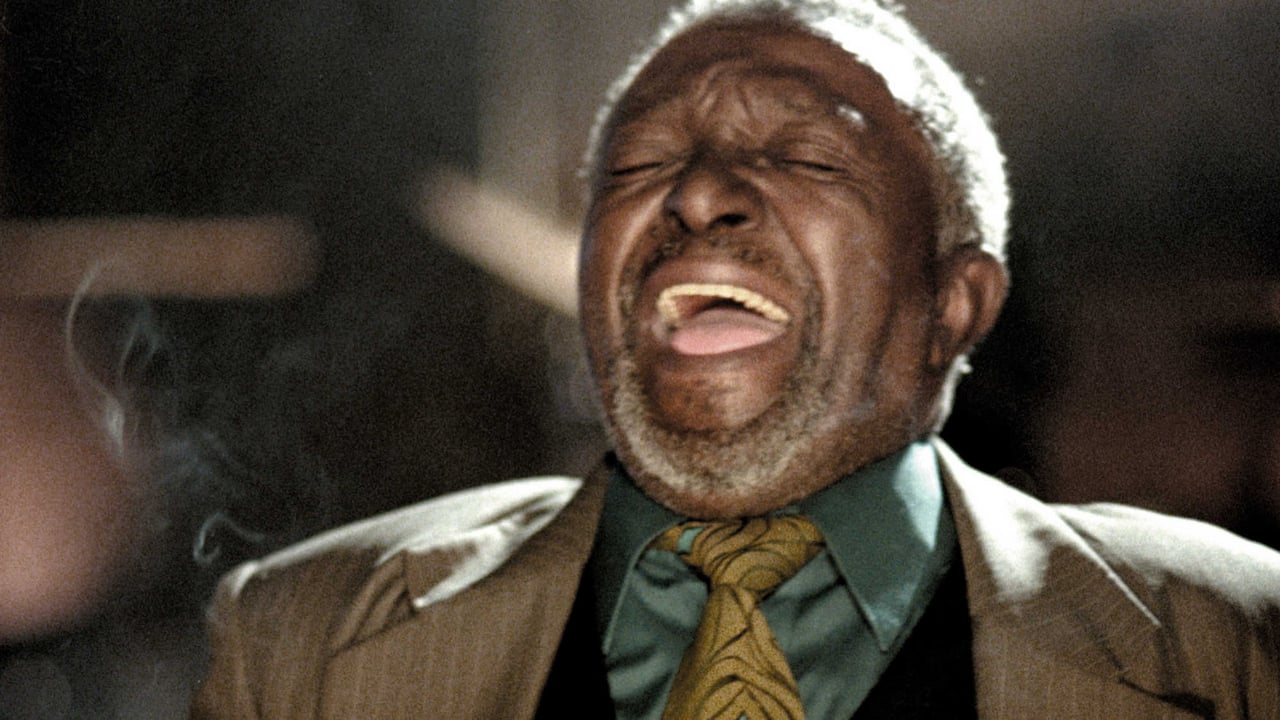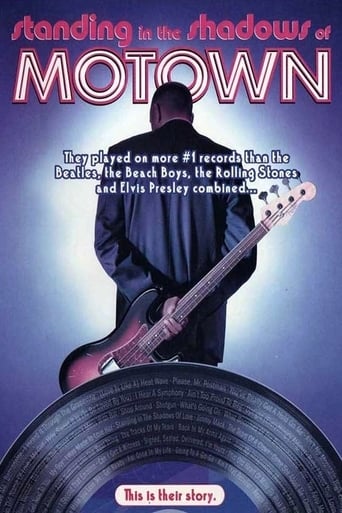

One of my all time favorites.
... View MoreDid you people see the same film I saw?
... View MoreOne of those movie experiences that is so good it makes you realize you've been grading everything else on a curve.
... View MoreStory: It's very simple but honestly that is fine.
... View MoreThis is ostensibly a documentary - and that's one side of it - but it's also a tragedy...and a must-see film for those who don't realize how the music industry eats up the talented and spits them out without consequence. More specifically, here's the story of Motown's Detroit glory years - and, especially, the unsung talents who achieved greatness without credit or proper remuneration. Fans of Berry Gordy are likely to lose some respect for him (as I did) as they learn how the musicians in the Motown sweatshop he ran churned out hit after hit only to be kicked in the butt, greatly underpaid for their services and later unceremoniously abandoned when Gordy left Detroit for glitzier digs in LA. Yes, as this film shows, Gordy was a business genius - he created a Ford-like hit factory like no one else, with a stable of songwriters, frontmen and women and a core of musicians who played behind a huge number of hits from the '60s and '70s (the subjects of this film). But - as this documentary reveals for the first time - Gordy was also tyrannical, unconscionably demanding, cold, cheap and unappreciative and he left in his wake real devastation, real tragedies.What an incredible story - and so sad. Yet along the way, you get to know many unsung musicians you absolutely must get to know. These are talents who must not be forgotten. They were responsible for a huge number of hits we all love yet they never got credit for the great talent they had or the work they put in - or the incredible number of top hits they played behind. They were the driving Motown sound, faceless and nameless. Finally...here's a documentary to right some of the wrongs - to give credit where credit is due. Here is a quintessential American story that must be told. And - tragic as it is - it is also truly incredible.
... View MoreI came close to giving this film a saggy review because I was left feeling unsatisfied. Then I reluctantly popped in Disc 2 to see the extras, and wow! That's the stuff I was waiting for."Standing in the Shadows of Motown" (the feature film) is a broad overview of the Detroit phenomenon known as The Funk Brothers whose music has touched every human life on this planet. The documentary is well-produced and polished, but it misses some of the details that we might hunger for.What challenges or tragedies did these people face? How did the group deal with certain members' substance abuse, depression, mania? What sort of camaraderie did they have? Any racial tensions? What makes their individual styles unique? Who is still alive today? How did so-and-so die?Few, if any, of these questions are answered in the feature film. In fact some of these issues were conspicuously avoided (and scenes deleted) almost as if the film producers decided to keep it cheerful & breezy instead of giving us the whole truth. The overriding theme of this film is that the Motown groove makes people happy, so it does make sense that they would cut out the sadder/tragic elements."Standing in the Shadows of Motown" takes the format of a collection of reminiscences, like browsing through an old photo album with friends. Interviews are garnished with old images, footage, and some re-created scenes with actors. Intermittantly we cut to the reunion concert for a song featuring well known contemporary singers. The feature film is oozing with feel-good nostalgia, mentioning only as footnotes how certain individuals were "tortured artists" or "battled with addiction". There was at least one powerful buildup to a tragic death, completely sidestepped to the point that I had to pause the movie and google how so-and-so died.Disc 2, I'm happy to report, fills in all the blanks. I would suggest first watching the featurette "The Ones That Didn't Make It" which tells you which of the Funk Brothers survived to see the completion of the film, who died during production, and who died before ever knowing they would be immortalized in this film. It's not just a macabre desire to know who's dead that interested me, but this featurette gave me more of an intimate connection with those who didn't survive. And it made me want to re-watch their interviews & performances so I could soak in every note.Disc 2 also has some raw yet emotional footage of the gang getting back together for the first time, hugging, joking and speaking incoherently in their secret code (literally, a secret language of pig-Latin and skatting fused together). I feel like the main feature could have used these scenes to establish the love they had for each other, transcending racial & cultural differences. Instead, the main feature focuses mostly on individual interviews, instead of everyone together in the same room.But for me, and for any musician-wannabe, the feature that knocked it out of the park was the multi-angle jam sessions. With your DVD remote you can choose what instrument you want to watch during their rehearsals. You can really scrutinize their technique, their gear and their style. THAT's what this film should have focused on... not just the story of a bunch of unsung heroes, but what made them heroes? What made this bunch of guys different from any other well-trained, skilled musician? Their performances say more than anyone could ever say, and the ability for us to pick what/whom we're looking at is a real treat for those of us who want to play musical detective.In all, this is an important film that all music lovers & musicians should see. Disc 2 is fantastic. The Disc 1 feature is good but not my favorite music documentary because it didn't really dig deep or pull together a story (which Disc 2 does much better). For a great example of a music storytelling documentary, check out "Anvil! The Story of Anvil" even if you're not an 80s metal fan; it's just a great story about a bunch of lovable guys who missed their shot.As for the Funk Brothers themselves, all hail. Thank you, sirs, for making the world a shade brighter. I finish with a quote spoken by Hugh Grant in the movie "Music & Lyrics"..."You can take all the novels in the world, and not one of them will make you feel as good as fast as... (sings) 'I've got sunshine... On a cloudy day...' "
... View MoreWhat a late, but appropriate tribute to the men behind the Motown sound. I love documentaries, and this one was particularly moving, because I grew listening to the Motown sound. I used to listen to it until I fell asleep at night (this was before we had TVs in every bedroom), and I woke up to the sound in the morning. I was even encouraged to pantomime to Motown tunes (and others) by my grandfather, who generously gave me a quarter after one of my performances, when I was 5, 6 and 7 years old. (Thank God I grew out of that phase or and my sister and cousins were very glad that it was over too.) I guess the reason I fought back the tears was because of the memories that each song they played and artist that was profiled brought back. There was nothing like that Funk Brothers beat! Those brothers need a memorial somewhere, and really should be inducted into a Hall of Fame of some sort. The Motown sound changed the sound of rhythm and blues, and the Funk Brothers were a major force behind it. A music scholarship in their name would be an appropriate tribute, as well.God bless all of you guys for doing such a great job.
... View MoreEverybody knows Motown music and pretty much everybody loves some if not all of the music and artists that came out of that stable. However not many people can name the group of musicians that supported the majority of these artists and are credited as the musical foundation for Motown records. That group of thirteen men became known as the Funk Brothers and this is the story of how they came together and influenced an entire generation of music.With so many reasons to make this documentary worth seeing, is there a reason why it is comparatively hard to find? Anyway, the story told here is not a great story but a collection of simple personal stories that come together to provide the story of the funk Brothers both as people but also as a group. On this level it is interesting, mixing some re-enactments with old footage/photographs but mainly talking heads with the surviving members of the group. The recollections are edited together well to construct a time-line of tales that manage to capture the personal side but also the scale of the influence the music (and the group) had at the time. On top of this, performances of the music for which they are famous are cut in every 10/15 minutes or so. While these are as funky as ever, it would have been nice to see more famous singers performing with them.Then again, maybe it was a deliberate decision to have the singers only be a couple of people who are not that well-known, in order to make sure that it is the musicians who get more attention than the singers after all, isn't that why most people know the original artists but not the musicians? Also it may have been to back up the claim made early in the film by Jordan that anybody could have sung these songs and the Funk Brothers would have made them sound good! The music does still sound good although I suppose it depends how possessive you are about the originals for example I didn't mind any of the changes except I didn't think a great deal of Chaka Khan doing "What's Going On?" because I just couldn't imagine anyone else doing it.Overall though, this film hits all the right notes in every sense of the phrase. It is informative and personal in equal measures and, although the original artists are not singing, the musical numbers are as funky as ever and show the influence the Funky Brothers had crossing oceans, genres and generations.
... View More